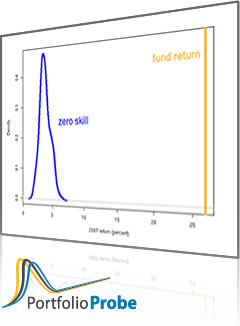Follow us using:
Newsletter Sign-up
Category Archives: Fund management in general
The Royal Institution starts a new club for finance
Exclusively for finance professionals who have a background in science and mathematics and want to keep their interests alive, the 14-10 club meets on a monthly basis to hear from top experts in science, maths and finance in a social and collegiate atmosphere in the heart of Mayfair. Speakers that are currently scheduled include: David … Continue reading
The benchmark gambit
What do we lose when we use a benchmark? Simple Make everything as simple as possible, but not simpler. — Albert Einstein Everything should be made as simple as possible, but not simpler. — Albert Einstein Everything must be made as simple as possible. But not simpler. — Albert Einstein Everything should be as simple … Continue reading
Testing an S&P 500 prediction
If a particular prediction comes true, how surprised should we be? The prediction The page that sparked my curiosity tells of a prediction made a year ago that the S&P 500 would beat its historic high by the end of 2011. It says that at the point the prediction was made, the level of the … Continue reading
MoneyScience is reborn
The MoneyScience website has recently had a dramatic change. It now has a social infrastructure, and the resources are better organized. Here I report on the discoveries I’ve made so far in the bit of time that I’ve been poking about on the site. Events There is a calendar of events that is organized by … Continue reading
Benchmarking low-volatilty strategies
Low volatility investing and performance measurement — my favorite topic scheme — how could I resist? The paper The paper is “Benchmarking Low-Volatility Strategies” by David Blitz and Pim van Vliet. The problem They claim that using a low-volatility index as a benchmark for a low-volatility strategy is not a good idea because: All low-volatility … Continue reading
Posted in Fund management in general, Performance
Tagged benchmark, low volatility investing
11 Comments
Bubble anatomy
Here is a schematic of a financial bubble. This is taken from a post by The Reformed Broker. Questions The picture feels right to me, but … Is there any data to support it? What process could fit a model like this without assuming the answer? Related posts Review of “Boombustology” by Vikram Mansharamani Subscribe … Continue reading
Market arrows
Graphs like Figure 1 are reasonably common. But they are not reasonable. Figure 1: A (log) price series with an explicit guide line. Some have the prices on a logarithmic scale, which is an improvement on the raw prices. The problem with this sort of plot is that two particular data points are taken as … Continue reading
Posted in Fund management in general, R language
Leave a comment
Review of “Boombustology” by Vikram Mansharamani
How can we spot bubbles before they burst? Executive Summary I had high hopes for this book. The first 5 chapters lived up to my expectations. The remaining chapters, though interesting in spots, are a bit vapid. However, those first 5 chapters are worth the price of admission. Chapters The book starts with a discussion … Continue reading
Posted in Blog, Book review, Fund management in general
Tagged financial bubble, Minsky Instability Hypothesis
2 Comments
A data search engine
Zanran is a new search engine that helps you find data. It indexes items that have tables or figures that seem to display data. It looks to be significantly more useful than a general search engine when it’s data you want. Search results are displayed in the manner you are used to. Except on the … Continue reading
Posted in Fund management in general
Leave a comment
Review of “Smart Swarm” by Peter Miller
Smart Swarm is a book about decision-making. Fund management is all about decision-making. Hence this book is about fund management. Indeed financial examples crop up several times. Executive summary Smart Swarm: Using animal behavior to change our world is interesting because it: describes many extraordinary decisions of animals. suggests a number of lessons that can … Continue reading
Posted in Book review, Fund management in general
1 Comment
